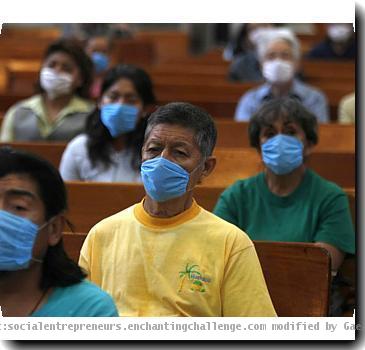Better watch out, better not cough: Santas lobby for swine flu vaccine
By Holly Ramer, APTuesday, November 17, 2009
Better not cough: Santas lobby for swine flu shots
CONCORD, N.H. — Forget cookies and milk. Santa wants the swine flu vaccine.
Many of the nation’s Santas want to be given priority for the vaccine and not just because of those runny-nosed kids. There’s also the not-so-little matter of that round belly. Research has suggested obesity could be a risk factor.
Swine flu has become such a concern that the Amalgamated Order of Real Bearded Santas featured a seminar on the illness at a recent conference in Philadelphia. The group also urged its members to use hand sanitizer and take vitamins to boost their immune systems.
The president of the organization said he also hopes parents will keep sick kids away.
“We don’t want any child to go without seeing Santa, but it’s not worth bringing your child to the mall, infecting the Santa and infecting the other children,” Nicholas Trolli said.
He recalled a boy who informed him last year that he had a fever and had stayed home from school. But, the child said, his mother thought it was a good day to visit Santa.
Ernest Berger, president of another group called Santa America, asked an Alabama congressman last week to designate Santas a priority group for the swine flu vaccine, like health care workers or infant caregivers.
A spokesman for Republican Rep. Jo Bonner confirmed Berger’s request and said staff members were looking into it.
Berger hopes Santas will use hand sanitizer and encourage children to do the same, without turning the experience into a hygiene lecture.
“It’s a delicate balance here. This is not an exercise in health care. This is visiting Santa,” he said.
Berger estimates that about two-thirds of all American Santas are overweight, and about a third are morbidly obese.
That raises health concerns because some research has suggested obesity could be a risk factor for severe swine flu.
A high proportion of those who have gotten severely ill from swine flu have been obese or extremely obese. But health officials have also said that might be due to the fact that heavy people tend to have asthma and other conditions that make them more susceptible.
The 200 or so Santas who volunteer to visit sick or grieving children through Santa America will be washing their suits daily instead of weekly and will not be wearing gloves this year so they can wash their hands frequently, Berger said.
John Scheuch of Prairie Village, Kan., said he might suggest to parents that they come back another time if a child is visibly ill.
“The kids are in the strollers, sniffling and coughing and hacking. … In the meantime, they’re interacting with other kids in line.”
Scheuch, executive director of Santa America, has taken some personal precautions. “I’ve had my H1N1. I’ve had my seasonal flu shot. This is my year for my pneumonia booster,” he said. “I don’t know what else I can do except encapsulate myself in plastic.”
In Nashua, N.H., hand-sanitizing stations have been set up around the Pheasant Lane Mall, including just outside the picket fence surrounding the Santa Claus area. But on a recent Saturday, not one of the dozen or so families who passed through used it.
Susen Mesco, owner of American Events and Promotions in Denver, Colo., which runs a five-day Santa school, said her Santas will be wearing gloves but changing them every three hours and washing them in anti-bacterial soap.
Dr. Jodie Dionne-Odom, New Hampshire’s deputy state epidemiologist, said going gloveless and using gel between each child would be the best option. She cautioned that viruses can live on unwashed hands for two to eight hours.
“If your hand was warm and moist, it could live longer,” she said. “It depends on whether you have a glob of mucus on your hand where it’s going to live happily versus a tiny speck. It’s kind of disgusting, but it would depend on what was on your hand.”
Dr. Jack Turco, director of health services at Dartmouth College, said Santa might consider greeting children from a few feet away rather than holding them on his lap, or asking children with coughs to stand in a separate line.
“If we take this really seriously, and I think we should because people are dying, it wouldn’t be inappropriate to say this is a year maybe we shouldn’t do these mass gatherings,” he said.
Tags: Concord, Immunizations, Infectious Diseases, New Hampshire, North America, United States

